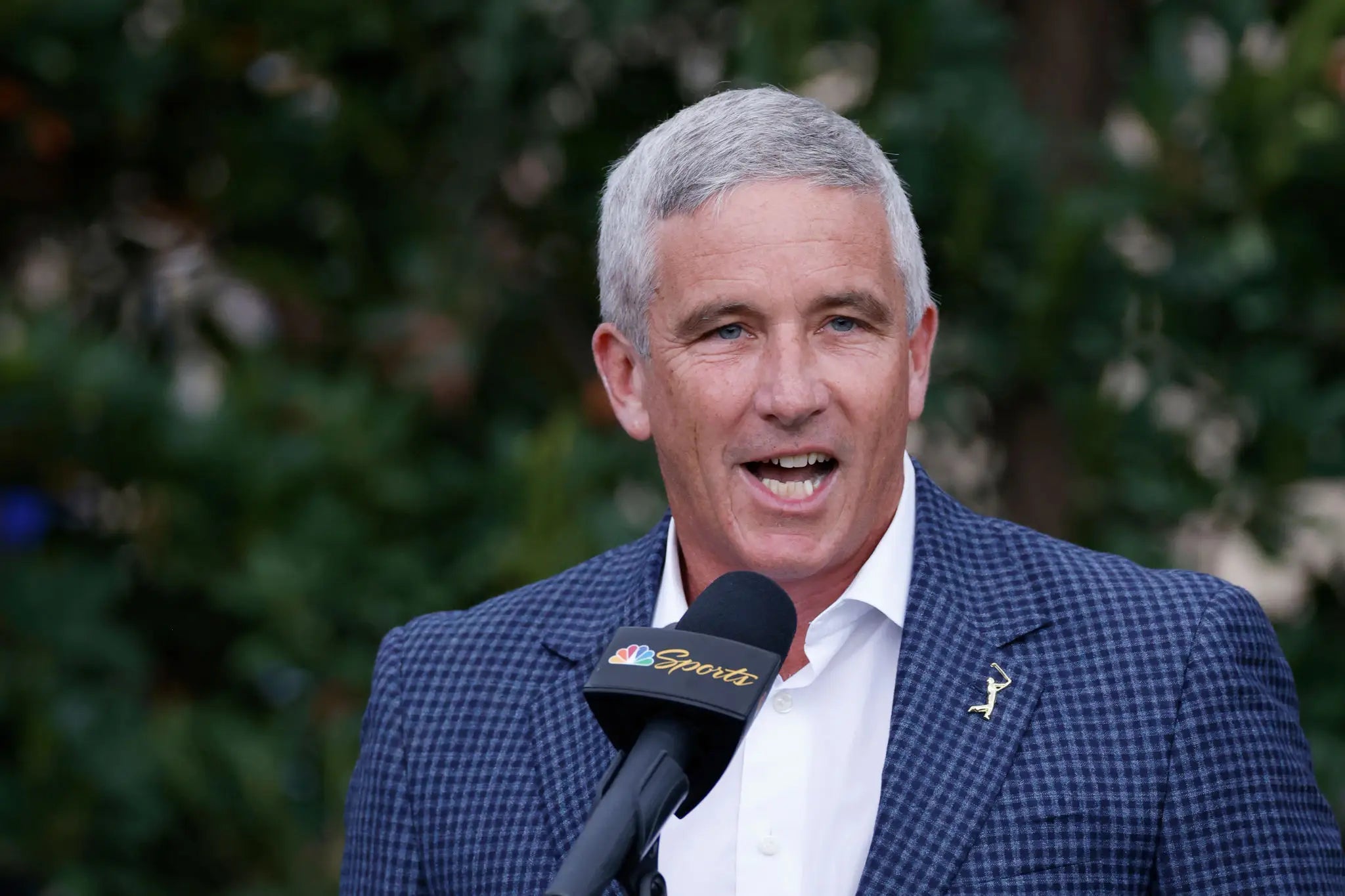Details Are Starting To Emerge About The Shocking PGA Tour-LIV Merger: How It Came To Be, Who Knew, And The Players-Only Meeting
 Icon Sportswire. Getty Images.
Icon Sportswire. Getty Images.Details are beginning to emerge about just how the monumental deal between the PGA Tour and Saudi Arabia's Public Investment Fund went down—who knew what, how it went down and the fiery players-only meeting that took place at the RBC Canadian Open today.' .
Nobody knew, including Rory and Tiger
The initial reaction after the news dropped was one of pure shock. No one had heard a peep about this being a possibility in the near future. That includes players of all levels on the PGA Tour. Collin Morikawa had no idea. Neither did Joel Dahmen. And, it turns out, neither did Rory McIlroy or Tiger Woods.
Golf Channel's Todd Lewis reported that McIlroy and Woods found out this morning along with the rest of the membership. How is that possible, for an organization that claims to be "member-run," to make the biggest deal in its history without input or knowledge from the players?
Because the negotiations were between a very, very small group of people. I'm also told that LIV executives were not told about the deal in advance and, as of about 4 p.m. EST time, hadn't received any communication from leadership explaining the move, the motivations and what might come next. This was downright Succession-esque: just a couple rich dudes in a room reshaping the room.
This wasn't really Jay Monahan's deal
On the PGA Tour side it was commissioner Jay Monahan—more on him in a second—Ed Herlihy, co-chairman of the powerful Wachtell, Lipton, Rosen & Katz law firm and golf powerbroker Jimmy Dunne, a senior managing director at Piper and something of a legendary figure within the game. Dunne is an Augusta National member, longtime president of Seminole Golf Club and close confidant to many top players.
Sources close to the negotiation tell me that Dunne played a crucial, if not decisive, role in the deal. He joined the PGA Tour policy board in November 2022, long after the beefing and the litigation began. His calculation was a cold one: the Saudis have billions of dollars to spend. Like, endless amounts, and their strategy was more or less to keep litigation going, continue to hand the PGA Tour legal bills and essentially pour money into LIV Golf to force the PGA Tour to do the same. But the PGA Tour simply couldn't—they don't have a $650 billion fund to dip into, so they had to get creative. They asked their sponsors for more. They dipped deep into their reserves, a move Monahan described as "betting on our product." Dunne and Herlihy first engaged Yasir al-Rumayyan, chairman of the PIF, without Monahan present. That laid the foundation for the deal.
"The first conversation that I was not a part of was what was the most important conversation because of the position I've been in and what we've been trying to do with our Tour," Monahan said Tuesday. "I wanted to rely heavily on those two fine gentlemen to have that first conversation.
"But when they came back and said it was a positive conversation and that I should have a follow-up meeting, I think that's when things started to develop."
The deal took about seven weeks to finalize, and Monahan, Herlihy and Dunne were the only participants on the PGA Tour side. The PGA Tour side feel they got a good deal—they now have the PIF money, which was going into golf anyway, under their control. There is no more litigation flying around. No more poaching of players. Just more money under the PGA Tour umbrella. And Monahan emphasized that the PGA Tour would continue to be in control of the PGA Tour.
"Ultimately (the move was) to take the competitor off of the board, to have them exist as a partner, not an owner, and for us to be able to control the direction going forward put us in a position as the PGA Tour to do and serve our members, and at the same time, again, get to a productive position for the game at large."
Players are livid with Jay Monahan
There was a players-only meeting at the RBC Canadian Open, and multiple players told me the mood inside was downright hostile. Players called for Monahan's resignation, and when he issued a half-hearted apology for his about-face, the reaction in the room, sometimes audible, was: own up to it. One player said multiple guys told Monahan they simply do not trust him and were wondering why they're listening to him.
Monahan, I'm told, maintained that the deal is in the best interest of membership. It wasn't a popular position in the room, nor in the media.
"I recognize that people are going to call me a hypocrite. Anytime I said anything, I said it with the information that I had at that moment, and I said it based on someone that's trying to compete for the PGA Tour and our players. I accept those criticisms. But circumstances do change. I think that in looking at the big picture and looking at it this way, that's what got us to this point."
There are, however, players who are taking a wider-range view: that they will still play golf for a living, on the best golf tour in the world, and likely get paid more money to do so. Top-level professional golfers are surely much better off today than they were a few years ago.
"Look, nothing's really going to change for me," says Joel Dahmen. "I'm still gonna show up and play golf in the best tournaments I can qualify for. Hopefully it's enough for me and my family to ride off into the sunset."

Advertisement
Team golf is not going anywhere
Al-Rumayyan is said to personally believe in the concept of team golf. And if there's one aspect of LIV that's most likely to continue under this new commercial entity, it's the team component. As for the rest—the shotgun starts and 48-man fields?
"We're in a framework agreement," Monahan said. "We haven't concluded the definitive agreement. I have not had the opportunity that I'm going to have to conduct a comprehensive empirical evaluation.
"I don't want to make any statements or make any predictions," Monahan said. "But what is in place is a commitment to make a good-faith effort to look at team golf and the role it can play going forward."
That sure seems like corporate-speak for: We don't think they have a very good product, but this guy's fronting the money, so if he wants team golf, he'll probably get team golf.
Did the DOJ investigation into the PGA Tour for anti-competitive practices play a role in this?
Monahan didn't acknowledge that at all, though one lawmaker did take to Twitter to highlight the irony of the developments.
"So weird," Connecticut senator Chris Murphy said. "PGA officials were in my office just months ago talking about how the Saudis' human rights record should disqualify them from having a stake in a major American sport. I guess maybe their concerns weren't really about human rights?"
How did Monahan explain his complete 180 from a year ago?
We'll let his words speak for themselves.
"What I'm trying to explain and I will continue to explain as we go forward, this ultimately is a decision that I think is in the best interest of all of the members of the PGA Tour, puts us in a position of control, allows us to partner with the PIF in a constructive and productive way, to have them invest with us, again, running the PGA Tour, having these three entities under one for-profit LLC.
"In terms of how did we get to this point and how did we go from a confrontation to now being partners? We just realized that we were better off together than we were fighting or apart."
